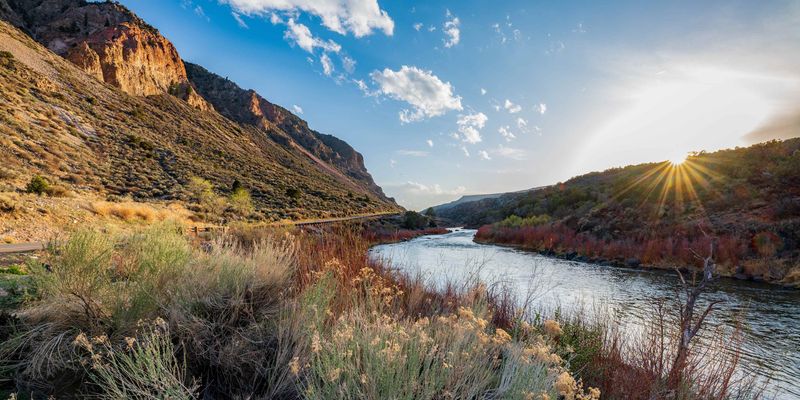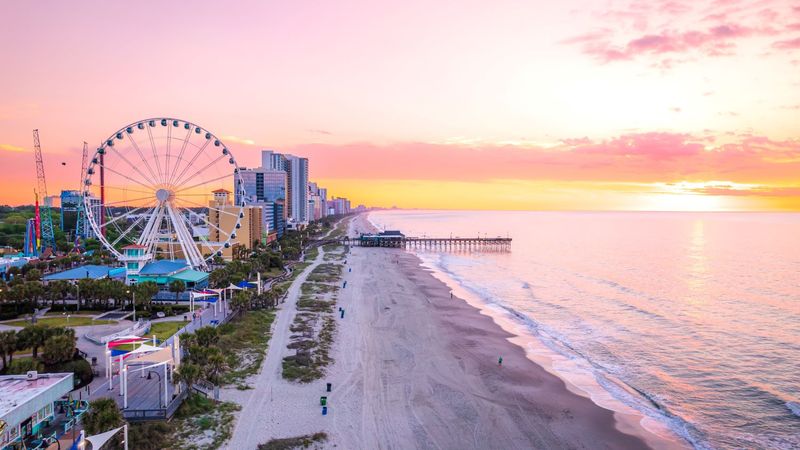Choosing the right state for retirement is a big decision for veterans. The perfect location can offer tax benefits, quality healthcare, and a supportive community.
On the flip side, some states present challenges that might drain your retirement savings or limit access to important services.
Let’s explore which states veterans might want to avoid and where they might find better options for their golden years.
1. Oregon: Beautiful But Costly for Veterans
Military pensions face full taxation in Oregon, immediately cutting into your hard-earned retirement income. The state’s natural beauty comes with a steep price tag – housing costs continue climbing, especially near metropolitan areas like Portland.
Rural veterans face additional challenges with scattered VA facilities requiring long drives for appointments. Winter weather in many regions can make these journeys even more difficult.
While Oregon offers incredible outdoor activities, the financial strain and healthcare access issues create unnecessary stress for many veteran retirees.
2. New Mexico’s Troubling Veteran Statistics
Veterans settling in New Mexico often encounter troubling realities behind the stunning desert landscapes. Crime rates rank among the nation’s highest, creating safety concerns in many communities where veterans might otherwise consider settling.
Employment opportunities remain limited, with one of the country’s highest unemployment rates. This presents challenges for veterans seeking part-time work to supplement retirement income.
Access to specialized healthcare can require extensive travel, particularly problematic for aging veterans with mobility issues or those needing regular treatment. The state’s VA facilities face persistent staffing challenges.
3. California’s Golden State Price Tag
California fully taxes military retirement pay, immediately reducing your monthly income compared to more tax-friendly states. Housing costs in California remain astronomical – even modest homes in decent neighborhoods often exceed $500,000 in many regions.
Daily expenses like groceries, utilities, and healthcare run significantly higher than national averages. Traffic congestion and long commutes to VA facilities add stress and transportation costs.
While California offers incredible weather and amenities, most veterans find their retirement dollars stretch much further elsewhere, allowing for a more comfortable lifestyle without constant financial pressure.
4. Washington State’s Hidden Retirement Costs
Washington lures veterans with its no income tax policy, but quickly reclaims those savings through sky-high housing costs. Seattle-area homes average over $700,000, with even outlying areas seeing dramatic price increases in recent years.
VA healthcare quality varies dramatically by location, with some facilities receiving concerning ratings. The famous rainy climate brings months of gray skies, potentially worsening conditions like depression.
Sales tax rates approaching 10% in many areas hit retirees on fixed incomes particularly hard. While Washington offers stunning natural beauty, the financial mathematics simply don’t work for many veteran retirees.
5. District of Columbia’s Urban Retirement Challenges
DC’s compact urban environment creates immediate challenges for veterans accustomed to more space. Housing costs rank among the nation’s highest – even modest apartments command premium rents, quickly depleting retirement savings.
Traffic congestion makes appointments at the VA medical center frustrating experiences. Parking remains scarce and expensive throughout the district.
While cultural amenities abound, the constant crowds, noise, and urban pace create a retirement environment many veterans find stressful rather than relaxing. Political protests and heightened security measures can further complicate daily life in the nation’s capital.
6. Illinois’ Financial Instability Concerns
Illinois’ ongoing pension crisis creates an uncertain financial future that should worry veteran retirees. The state’s fiscal problems frequently trigger tax increases that disproportionately impact those on fixed incomes.
Property taxes rank among the highest nationwide, with some homeowners paying over $10,000 annually on modest homes. Winter weather brings additional heating costs and mobility challenges for aging veterans.
While Chicago offers world-class amenities, the state’s smaller communities often struggle with declining services due to budget constraints. Veterans seeking stable, predictable expenses in retirement often find Illinois’ financial volatility concerning.
7. Rhode Island’s Compact Retirement Disadvantages
Rhode Island’s tiny footprint comes with surprisingly large costs for veteran retirees. Housing prices remain stubbornly high, especially in coastal areas most appealing to retirees.
The state offers fewer veteran-specific tax exemptions compared to neighboring states. Winter weather brings significant heating costs and mobility challenges for several months each year.
With just one VA medical center serving the entire state, healthcare access can become complicated depending on where you settle. While Rhode Island offers charming coastal communities, veterans often find their retirement dollars stretch further in nearby states with similar amenities but better veteran benefits.
8. Hawaii’s Paradise Price Problem
Hawaii’s breathtaking beauty masks serious financial challenges for veteran retirees. Housing costs reach astronomical levels – even modest homes frequently exceed $800,000, with many areas averaging well over $1 million.
Everyday expenses shock mainland transplants. Groceries cost roughly 50% more than national averages, with gasoline, utilities, and healthcare similarly inflated. The isolated location means traveling to see mainland family becomes an expensive, time-consuming proposition.
VA healthcare facilities, while available, serve a large geographic area across multiple islands, potentially requiring inter-island travel for specialized care. Paradise comes at a premium few veteran retirement budgets can comfortably sustain.
1. Florida: Sunshine State Savings
Florida eliminates state income tax, immediately preserving more of your military pension and retirement income. The state hosts numerous VA facilities, ensuring convenient healthcare access regardless of where you settle.
Housing remains affordable in many attractive communities, especially compared to coastal states like California. Year-round warm weather eliminates heating costs and winter-related expenses.
Florida’s massive veteran population creates built-in community support and understanding. Many businesses offer veteran discounts, and the state continually expands veteran-specific programs. From fishing to golfing to theme parks, retirement activities abound without the burden of heavy winter clothing.
2. South Carolina’s Southern Hospitality for Veterans
South Carolina completely exempts military retirement pay from state income tax, immediately boosting your monthly budget. The cost of living runs 10-15% below national averages, with affordable housing in both coastal and inland communities.
The state boasts excellent VA facilities, including the Charleston VA Medical Center consistently rated among the nation’s best. Mild winters reduce heating costs and eliminate snow removal concerns.
Strong military presence from bases like Fort Jackson creates communities that understand and respect veteran service. Outdoor activities remain accessible year-round, from golf courses to beaches to mountain trails, providing endless retirement recreation options.
3. Virginia: Military-Friendly Commonwealth
Virginia’s military-rich culture creates immediate belonging for veteran retirees. The state hosts one of the nation’s highest concentrations of veterans, ensuring your service is understood and appreciated.
Recent legislative changes have progressively increased the military retirement pay tax exemption. Proximity to Walter Reed and other major military medical facilities provides access to specialized healthcare.
Virginia offers diverse living options – from coastal communities to mountain towns to suburban neighborhoods near DC. The state’s strong economy provides part-time employment opportunities for veterans seeking to supplement retirement income while maintaining connections to the working world.
4. Texas: Lone Star Benefits for Veterans
Texas offers an unbeatable combination of no state income tax and a cost of living below national averages. Your military retirement pay stretches significantly further here than in many coastal states.
The state hosts numerous major military installations, creating communities that understand and respect veteran service. VA healthcare facilities dot the landscape, ensuring access regardless of where you settle.
Housing costs remain reasonable, with many attractive communities offering homes under $300,000. The state’s size and diversity mean veterans can choose from beach towns, hill country retreats, urban centers, or rural ranches while maintaining access to veteran-specific services.
5. New Hampshire: New England Without the Taxes
New Hampshire stands uniquely among New England states with no income tax and no sales tax, preserving more of your military pension and retirement savings. The state’s commitment to fiscal responsibility creates stable property taxes compared to neighboring states.
Four distinct seasons offer variety without extreme weather in most regions. The Manchester VA Medical Center provides quality care, with Boston’s specialized medical facilities within reasonable driving distance.
Strong public safety records and low crime rates create peace of mind for retirees. While housing costs exceed national averages, they remain significantly lower than nearby Massachusetts or Connecticut, offering New England charm without the accompanying financial strain.
6. Tennessee: Volunteer State Values Veterans
Tennessee eliminated income tax on all forms of retirement income, allowing veterans to keep more of their military pensions. Housing costs run 20-30% below national averages in many communities, including attractive areas near Nashville, Knoxville, and Chattanooga.
The state hosts seven VA medical centers and numerous outpatient clinics, ensuring accessible healthcare. Mild four-season climate provides variety without extreme winter conditions in most regions.
Strong veteran communities offer built-in social connections, particularly around military installations like Fort Campbell. Tennessee’s central location makes visiting family throughout the eastern U.S. relatively convenient, while low overall cost of living helps retirement dollars stretch further.
7. Alabama: Southern Value for Veteran Retirees
Alabama fully exempts military retirement pay from state income tax, immediately preserving more of your pension. Housing costs run significantly below national averages – quality homes in nice neighborhoods often sell for under $250,000.
The state hosts multiple military installations, creating communities that understand and respect veteran service. VA healthcare facilities operate throughout the state, including the advanced Birmingham VA Medical Center.
Mild winters eliminate many cold-weather expenses and maintenance concerns. Outdoor activities remain accessible year-round, from Gulf Coast beaches to mountain trails in the north. Low overall cost of living allows retirement dollars to stretch significantly further than in many other states.
8. North Carolina: Tax Relief and Military Community
North Carolina recently eliminated state income tax on military retirement pay, immediately boosting monthly income for veteran retirees. The state hosts major military installations like Fort Bragg, creating communities that understand and respect veteran service.
Diverse geography offers retirement options from coastal communities to mountain retreats, with housing costs below national averages in many areas. Four distinct seasons provide variety without extreme weather in most regions.
The state’s four VA medical centers and numerous outpatient clinics ensure accessible healthcare. Strong veteran support organizations operate statewide, providing community connections and assistance navigating benefits. Outdoor recreation opportunities abound year-round.
















